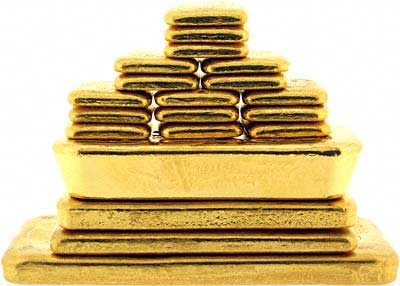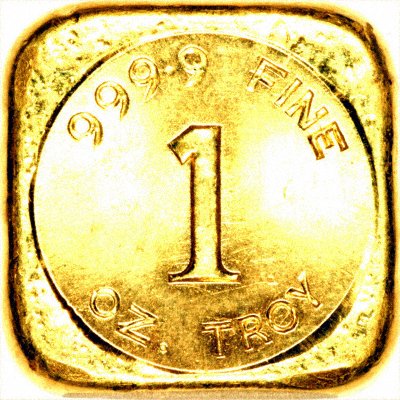|
Gold News & Press Comments
Federal Reserve Interest Rates, Gold & Dollars
As managers of the world's most important reserve currency, the Federal Reserve, and the decisions it makes, affect the entire world. For a number of year's now, there has been much said about the twin deficits being run by the US government, and how this must lead eventually to an adjustment in the value of the dollar. When this happens, it is quite easily possible that confidence in the dollar will decline rapidly, and its value drop drastically.
In their book "Wake Up", Jim Mellon & Al Chalabi argue that this will happen soon. We are starting to see more frequent press comments about the difficult choices facing the Fed.
A Few Selected Press Comments
-
Fed's Economic Policy Must Change
Edward Dahmus
Sun Sentinel, South Florida
Boca Raton
Posted June 17 2006
It is time for the U.S. Federal Reserve (the Fed) to realize that action that penalizes U.S. consumers and businesses while rewarding foreign consumers and businesses is not sound U.S. economic policy.
I believe that when the Fed raises interest rates, it does little to reduce U.S. inflation, but does a lot to reduce U.S. competitiveness. Many years ago, when the U.S. economy was the predominant world economy, the policies of the Fed had the desired impact because the U.S. economy was in fact the bulk of the world economy.
Now, when Europe and Asia are also economic powerhouses, and when countries such as China and India are competing in the world markets for the same commodities that the U.S. is trying to buy (commodities that the U.S. does not control), a rise in U.S. interest rates reduces U.S. demand for these commodities, but does not necessarily reduce prices (and thus inflation), because of demand from outside the U.S.
And, in fact, if prices for these commodities do fall, the first beneficiaries of these reduced prices are not U.S. consumers and businesses, but in fact are consumers and businesses of other countries. In other words, while U.S. consumers and businesses are forced to cut back, these countries benefit, becoming more productive and competitive. Is this really good for the U.S.? It's time to change.
We believe this is a typically parochial view from a reporter on a small town local US newspaper.
-
Investors Can't Hide From Higher Interest Rates
IRWIN STELZER
American Account
Sunday Times, June 18th 2006
GLOOM, turbulence, volatility. This is a small sample of the adjectives festooning the business pages as America reaches what is being called "the end of the era of easy money". Result: a worldwide "flight to safety:, as investors end their speculation in commodities and in the stock markets of places that they probably can't find on the map. But as heavyweight champion Joe Louis once said when told his next opponent was fleet of foot, "He can run, but he can't hide." A knockout followed.
Investors can indeed run from places and commodities they now deem too risky, but there seems to be no place to hide. True, American share prices have done well, and provided something of a safe haven for nervous money, but only when compared with markets in developing countries. That's because, as the gang members in West Side Story informed the local policeman, "We've got troubles of our own".
One such trouble seems to be uncertainty over whether Ben Bernanke, chairman of the Federal Reserve Board, is up to the job. Nobody doubts his credentials as an economist. Rather, it is because some observers doubt Bernanke's ability to communicate his intentions to the markets in an orderly way. First he hints that the series of rate increases might end, or at least be suspended temporarily. Then he lets slip an unguarded remark to a television journalist at a dinner party, suggesting he had been misunderstood. Then he attempts to burnish his credentials as an inflation fighter by publicly restating his determination to keep the inflation genie bottled up.
Another problem is that investors fear a return to the bad old days of stagflation, with inflation rising and the economy sinking. Their fears about resurgent inflation were fanned last week by the release of data that show that in the past three months the core rate of inflation (excluding food and fuel) has risen at an annual rate of 3.8%, far above the 1%-2% that the Fed chairman and his colleagues have been trumpeting as their "comfort zone".
So, as we have been saying for some time, the Fed cannot stop ratcheting up of rates and will have to go beyond its current "5% solution" if Bernanke is not to be seen as so rattled by recent market turmoil that he throws in the towel and lets inflation get out of hand. The markets are now certain that another increase, the 17th, will bring rates to 5.25% at the end of this month, and are assigning a 50-50 probability to a further increase in the summer.
There is a crowd that traditionally worries about Fed "overshoot" - interest-rate increases that not only slow the economy but throw it into recession - but they are not the only ones on edge. A new crop of Fed critics is abroad in the post-Greenspan land. They make three points.
First, it is not the Fed's job to look in the rear-view mirror, which is what it will be doing if it gets spooked by recent inflation data. It has to look ahead. And this is one instance in which the past is not prologue.
That is because, second, the economy is already slowing, and doesn't need the Fed to tramp down harder on the brakes. As the Fed's most recent summary of current economic conditions (known as The Beige Book) points out, there are now "some signs of deceleration" in the rate at which the economy is expanding. Among other signs of a cooling, the Fed report noted that the growth of consumer spending has slowed. That, say economists at Goldman Sachs, can be traced to MEW - an acronym with which readers might want to become familiar because they will see more and more references to it.
MEW is mortgage equity withdrawal - the cashing out of the rising equity value of a home. American consumers have loved their MEWs, and used their homes as cash machines to fund their visits to the shopping malls. That process seems to be slowing, partly because consumers' appetites for new cars and home furnishings have waned in response to high energy prices, which Bernanke last weekend declared to be a permanent feature of American life. A slowing housing market also has knock-on effects on total construction, which in turn is reflected in recent weak employment data. That's another reason consumers might be ready to tighten their belts.
The third criticism of the Fed is that its models are too parochial. The Fed worries that America's low 4.6% unemployment rate is setting the stage for a round of wage increases, and that growing pressure on America's productive capacity means that we are about to see the return of corporate "pricing power". But in a globalised economy, with millions of Chinese willing to work at daily wages far below what Americans get for an hour's work, tight national labour markets create less inflationary pressure than in the past.
So say the critics, who argue that a sensible look in a clear crystal ball would tell the Fed to stay its hand. The slowing of the economy will ease inflationary pressures, and further interest-rate increases will only throw a slowing economy into recession.
Theirs is a voice in the wilderness. Too many Fed governors and regional bank presidents - about a dozen at last count - have spoken out in recent days to join Bernanke in signalling that investors have at least one, and probably two further interest-rate increases in their futures. That will slow not only the American economic locomotive, but the economies it drags along. Not enough to trigger a recession in a still robust economy. But enough to keep investors on the edge of their seats.
Irwin Stelzer is a business adviser and director of economic policy studies at the Hudson Institute.
In our view, Irwin Stelzer always seems to present a well thought out and sensible view.
Lowest Recent Gold Price
Bull Market?
Does the drop after this price peak mean an end to the gold bull market, we believe not, more of a correction.
|
|

Gold Bar Stack

One Ounce Gold Bar
Gold News & Comments
Bullion Coin Selector Page
|


